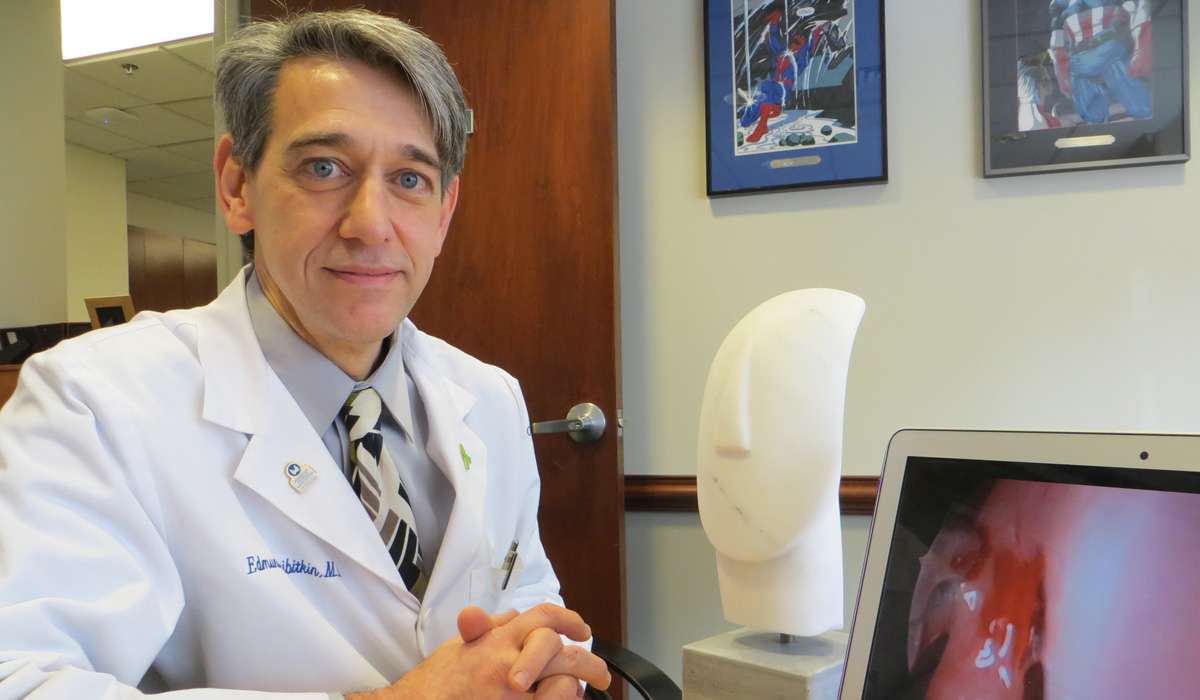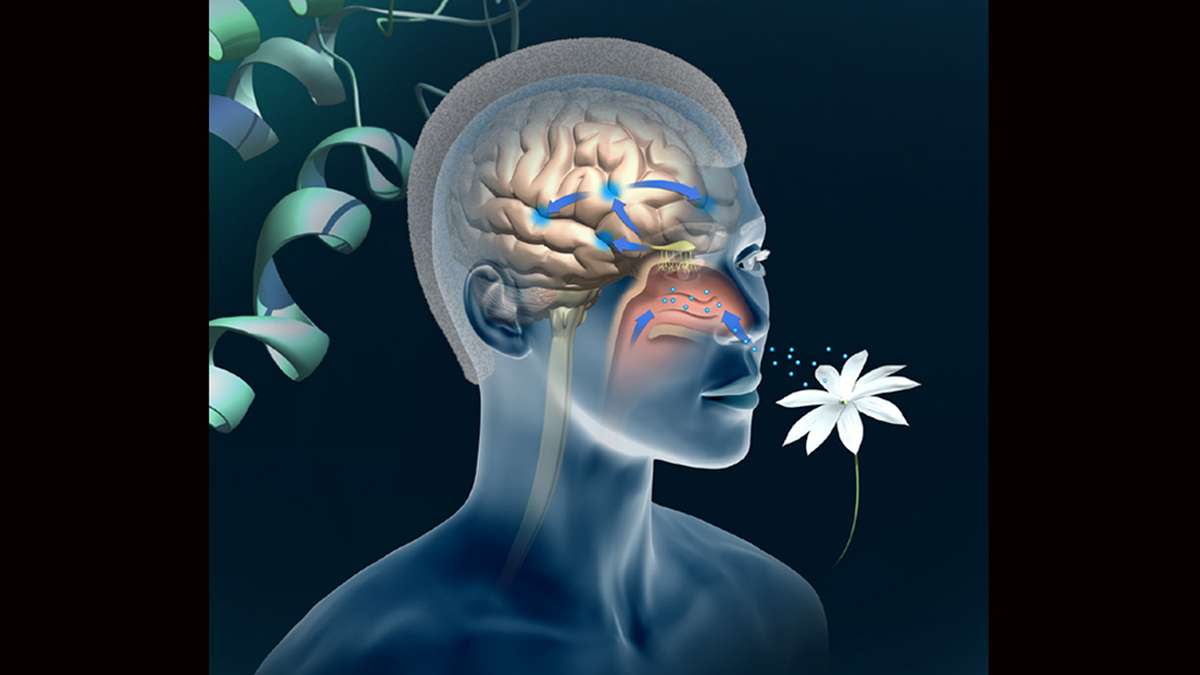Can researchers re-ignite someone’s sense of smell through nasal stem cells?
Listen-

-

-

Olfactory perception graphic showing how receptors detect and process odorant molecules. (Image courtesy of the Monell Chemical Senses Center)
Researchers at the Monell Chemical Senses Center are searching for new ways to treat smell-loss.
Researchers at the Monell Chemical Senses Center and Jefferson University Hospital are looking for a lab-fix for smell loss by duplicating the body’s ability to build nerve cells that detect odor.
Serious sinus troubles, head trauma or a bad case of the flu can wipe out one’s sense of smell. Depending on what causes smell loss, medicine can sometimes help, but treatment options are limited.
Monell director Gary Beauchamp says smell is the sense we take most for granted, and smell loss is often underrated when it comes to health and well-being.
“Smell is maybe the most primitive of senses. It’s the major source of information for most species on the planet,” Beauchamp said.
Lab rats and mice are better smellers, but humans are also constantly sniffing out danger including spoiled food, gas leaks and even body odor.
The sense of smell is part of an early-warning system that inextricably links smell and taste. To demonstrate, Beauchamp conducts a do-it-yourself smell test using jellybeans.
For the experiment, highly flavorful, gourmet jellybeans work best. Beauchamp holds his nose—tightly–and without looking, pops a jellybean in his mouth. Then he describes the experience.
“The only thing I get in terms of flavor is sweet,” he says.
When Beauchamp releases his nose … ‘Boom.’ Suddenly the licorice is easy to recognize. On its own, the tongue perceives salty, bitter, or sour, but without smell, the subtleties of anise or fennel are missing.
When people go to the doctor complaining about smell loss, they usually don’t get much sympathy.
“Patients hear: ‘Hey, it’s not cancer, you won’t die from it,'” Beauchamp said. “Which is true, but for many people, their life is really changed.”
Anosmia is the medical term for an inability to perceive odor.
Years ago, after a battle with the flu, Beauchamp experienced anosmia for about three weeks.
“At the time, I had young children, I couldn’t smell them,” he said. “There are some bad smells associated with babies, but there are some really good smells, and I wasn’t getting that, and that was terrible.”
Smell is hardwired to the emotional parts of the brain, and people who have a permanent loss sometimes struggle with sadness—and face a higher risk for depression.
Researchers at New York’s Rockefeller University surveyed people with smell loss and reported negative consequences for their quality of life.
“I am especially anxious about my home because I can’t smell dirt and “cleanliness” (for lack of a better word) and have become somewhat fixated on not letting people in,” one survey respondent wrote in the study published in 2013.
Starting the search for new smell-loss treatments
When the nose is working properly, olfactory receptor neurons—nerve cells in nasal tissue–grab odor molecules from the air then transmit that signal to the brain.
“And the brain registers ‘Oh, this is the wonderful smell of lilacs,’ said Edmund Pribitkin, an ear, nose and throat specialist at Jefferson University Hospital.
Imagine yourself with an upper respiratory infection. When you’re sniffling and congested, that means a cold virus has taken up residence in the lining of your nose.
A virus also enters olfactory receptor neurons—or odor-detecting nerve cells.
“Your body says: I’ve got this horrible virus entering the neurons that go up to my brain, I better just cut this bridge,” Pribitkin said. “It’s a defense mechanism, it lets the neuron die.”
Better to sacrifice the sense of smell than to risk brain inflammation–encephalitis or meningitis. At least that’s what researchers think happens—it’s not entirely clear.
Nerve cells in the nose can recover, but depending on the cause of smell loss, people often have permanent damage.
In the case of viral-induced smell loss about two-thirds to three-fourths of patients recover, but that improvement can take several years, according to research at Monell.
The recovery rate is much lower for people who suffer head trauma where a blow seems to cut the connections between the brain and smell cells.
The scientists at Jefferson and Monell are looking for new ways to treat smell loss using nasal stem cells. They want to engineer stem cells in the lab to become functioning nerve cells that control smell.
Different from embryonic stem cells, which have the potential to morph into any cell type, the potential of adult nasal stem cells is more restricted—they can become neurons or the supporting cells that give nasal tissue its structure.
“In the plant world, if you plant basil, you get basil, but the amazing thing about these types of cells is we can take these seeds and maybe we can decide after we’ve planted it, whether it grows into tomato or basil,” said Pribitkin, who’s a physician and a gardener.
Research begins by collecting nasal tissue from healthy volunteers. Pribitkin says the biopsy can be done in a simple office procedure after numbing the nose.
“With very, very small forceps about the size of a pencil tip, we can take the cells we need to do research,” he said.
Next, that nasal tissue gets shipped across town to Monell. Researcher Mridula Vinjamuri and her team are figuring out how to keep the tissue alive and healthy under artificial lab conditions.
Vinjamuri, who’s a mouse geneticist, is already working with cells from mice, but similar studies using human cells start in a few weeks.
The work ahead is to isolate stem cells in the nasal tissue and then nudge them to become odor-detecting neurons. If all that goes well, the scientists hope to place those stem cells back in the nose—of a mouse—or a person—with smell loss.
That goal is complex enough–and years away—but Vinjamuri says there’s an even bigger obstacle ahead because of a quirk in the way smell works.
Neurons in the nose are coded for, or only lit up by, certain smells.
“Each neuron can sort of detect a specific odor. For instance, if you have an odor for like strawberries or bananas, only a certain subset of neurons can smell that,” Vinjamuri said.
Getting a nose to detect an odor—that’s just one step. Success is making sure the lab-engineered; replacement cells send the right signal back to the brain.
Wider interest in the science
Only about 3 to 5 percent of Americans have lost their sense of smell—but scientists say there are wider applications for smell research—even if the federal funding is waning.
“The work that we’ve done is increasingly funded by corporations and/or private donors,” Pribitkin said.
There’s an ongoing debate about whether smell loss is an early symptom in people with cognitive decline such as Alzheimer’s or Parkinson’s. And Gary Beauchamp says, in the general population, smell perception lessens starting at age 70.
“Your cells are just as sensitive as they were when you were young,” Pribitkin said. “But you actually lose specificity. What that means is that a smell will trigger a whole bunch of cells in the nose instead of the one it’s supposed to, so your smell map gets muddied as you get older.”
WHYY is your source for fact-based, in-depth journalism and information. As a nonprofit organization, we rely on financial support from readers like you. Please give today.



